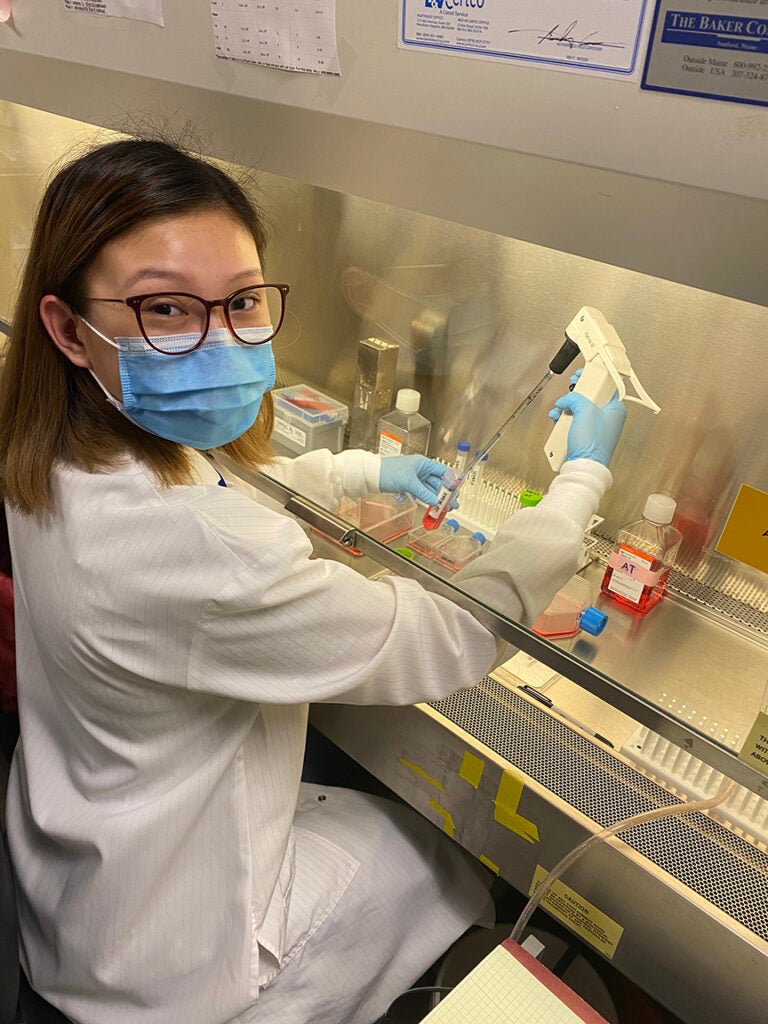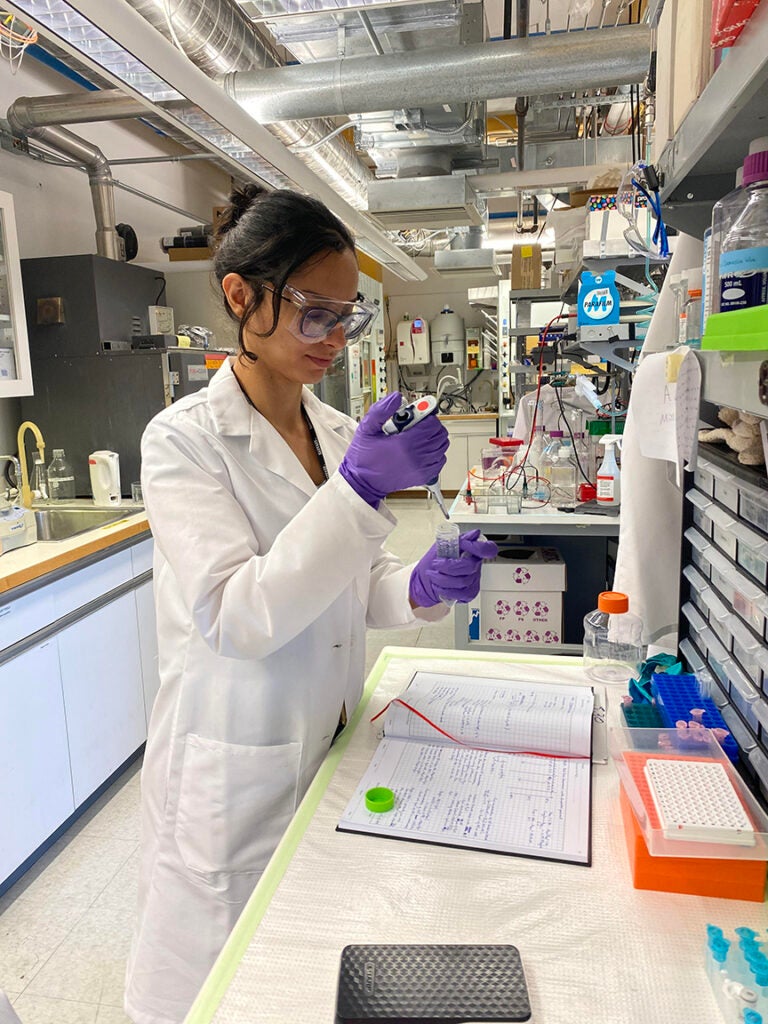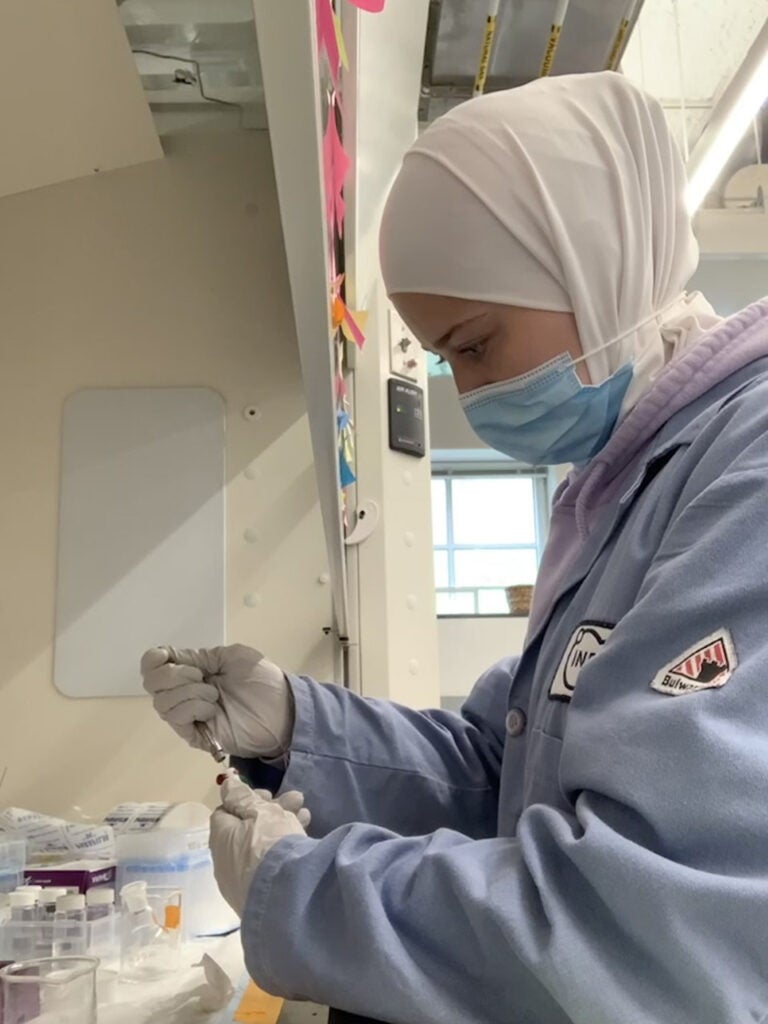KINGSTON, R.I. – Aug. 23, 2022 — Nana Oblie was a bit nervous. Her University of Rhode Island mentor, Assistant Professor of Pharmacy Matthew Bertin, had contacted the lab and the postdoctoral mentor ahead of time, but this was Yale, after all.
That feeling didn’t last, though, as she was quickly made to feel welcome in Yale Associate Professor of Chemistry and Microbial Pathogenesis Jason Crawford’s lab. People from other fields came in to help her as well.
“We are doing cancer research,” Oblie said. “We’re trying to see whether a strain in our gut causes colorectal cancer. If a strain is found to be genotoxic, we’ll purify some of the compounds to see what they are.”
Oblie is one of five URI students who spent their summer conducting research at top universities through the MARC U*STAR program (Maximizing Access to Research Careers: Undergraduate Student Training in Academic Research). It places students in research laboratories for two years and offers them summer research internships. This year’s group came away with new research abilities, and more than one with added self-confidence.
Oblie, a rising senior from Providence, was happy to find that some of the instruments in the Yale lab were the same as those she had used at URI. “It just helped me improve upon my research experiences.” She finds the work “good but challenging” because some of the materials are new to her. When she began work, her interest was mainly in plant science. The change to cancer research was eye opening. “I’m now leaning towards cancer, but I want to do an M.D./Ph.D. I’d like to practice for oncology and also do some cancer research on the side.“

With Ashley Tai, a rising senior from Braintree, Massachusetts, that self-confidence came from handling what could have spelled disaster. She had begun working at Brigham and Women’s Hospital researching the way cells respond to stress by forming stress granules in the body. Their exact function is undetermined, but Tai reported that many cancers, viral infections, and neurodegenerative diseases have to do with stress granules. The first weeks found Tai adjusting well to the new protocols. Then came a surprise.
“The postdoc I worked under tested positive for COVID three weeks into my internship, which kept her out of the lab for three weeks. I was kind of on my own. The first week of that was really tough, but I feel I’m a better researcher and a better scientist for having gone through it. I was thrust into a situation where I had my notes on how to do things. I had never put them into practice. And I became a lot more independent in the lab, which was very, very good for me.” Tai and her mentor kept in touch through regular Zoom meetings and through email. “She really was very happy with all the work I did in her absence.”

The summer internship at Harvard University led Camila Cersosimo to make some important changes in her major. The rising junior from Lincoln, initially thought she would be working in a biology lab, like her URI work studying nanoparticles as a drug delivery vector.
“I knew that Harvard had some people working in drug delivery, but I was surprised when they actually put me in a physics lab,” Cersosimo said. “But this is perfect because I get to take all the principles that I’m learning in my chemical engineering classes, and instead of applying them to big reactors and chemical plants, to apply them to tiny things like viruses. They work the same way. That was unexpected, but I feel like I’m just where I want to be.”
Cersosimo hadn’t considered physics as something she would enjoy, but her summer work gave her insights into new possibilities. “It’s been wonderful. I really like everyone at my lab, and the fact that I like applied physics surprised me. I have a lot of independence to go into the lab and do my own little experiments. Seeing the results is very exciting.” She’s “99.9% sure” that she’ll pursue a Ph.D. in applied physics or biophysics.

Dana Allababidi’s inspiration to intern at Johns Hopkins University was academic and personal. “It’s a blessing to be at Johns Hopkins, as they have a lot of technology that is unavailable in other places. It’s been interesting to see the things that I’ve been doing at URI and applying them here.
“My main interest of cancer research stemmed from close family members having cancer, and just me wanting to learn about less invasive treatments that are less detrimental to the person’s health. So that’s kind of where my interests in drug delivery came from: in the hope that I can contribute.”
Allababidi spent much of her time investigating the use of liposomal treatment, a drug preparation that contains the active drug inside very tiny, fat-like particles. She also shadowed other scientists and applied some of what she saw into work on her own projects.
There were other benefits as well. She said that the new environment and all the routines that went with it, learning to communicate with people better, and finding her own voice were important to her.
“There are a lot of lessons that I definitely needed,” Allababidi said. “Whether to have a future in science and or as a researcher, I’m very grateful that I’m getting this experience early on. There are some skills that you need other than lab skills that will be very necessary for you to be successful in such a field.”
Then there’s Nicole Casale, a 2017 graduate with four children who never stopped looking for a job. Now (as of this writing), she’s researching malaria in week 10 working at Brown University’s Center for International Health Research, led by Dr. Chris Nixon, associate professor of pathology and laboratory medicine. The rest of the year she’s at the Institute for Immunology and Informatics at the University of Rhode Island’s Providence campus, which provided her with an understanding of malaria.
“Researching malaria was the one thing that really drew my attention because it’s a number one killer of people,” Casale said. “Anything that helps people or humanity as a whole is something that I’m always very interested in, especially when so many children are dying and it affects many pregnant women. That’s pretty much the reason why it drew me, because it’s along the same lines of researching pathogens and helping people, even if I’m just a small part. At least I’m part of a larger puzzle.
“I’ve learned that I really enjoy research, working on different constructs, putting things together. Even when something fails, I still enjoy it because it leads me to more critical thinking. The internship has given me a glimpse into what it would be like to do a rotation when I go into grad school. And also, it has also made me realize that as far as industry versus academia, I’d like to stay in academia after grad school.”
Casale is proud that she returned to URI and is looking forward to more learning. “It’s nice, because no matter what you go through in life, nobody can take away your education.”
This story was written by Hugh Markey.
